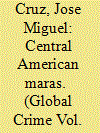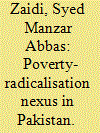|
|
|
Sort Order |
|
|
|
Items / Page
|
|
|
|
|
|
|
| Srl | Item |
| 1 |
ID:
099865


|
|
|
|
|
| Publication |
2010.
|
| Summary/Abstract |
Most of the empirical research on Central American street gangs, called maras, has been published only in Spanish. Reviewing that literature, the American scholarship on gangs, and my own research on Central American gangs from the mid-1990s, this article depicts the processes through which the maras (Mara Salvatrucha and the Eighteenth Street Gang) evolved from youth street gangs in the late 1980s to protection rackets with features of transnational organisations. Intense migratory flows between El Salvador, Guatemala, Honduras, and the United States, and the hard-line suppression policies against youth gangs in institutionally weak Central American countries created the conditions that prompted networking and organisation among Central American street gangs. This article highlights the changes in the dynamics of violence and the transformations in the gangs' social spaces to illustrate the evolution of the maras.
|
|
|
|
|
|
|
|
|
|
|
|
|
|
|
|
| 2 |
ID:
099867


|
|
|
|
|
| Publication |
2010.
|
| Summary/Abstract |
We gauge the cost of crime in Italy by concentrating on a subset of offences covering about 64% of total recorded crimes in the year 2006. Following the breakdown of costs put forward by Brand and Price, we focus on the costs in anticipation, as a consequence, and in response to a specific offence. The estimated total social cost is more than €38 billion, which amounts to about 2.6% of Italy's GDP. To show the usefulness of these measures, we borrow the elasticity estimates from recent studies concerning the determinants of crime in Italy and calculate the cost associated with the surge in crime fuelled by unemployment and pardons. Indeed, in both cases such costs are substantial, implying that they should no longer be skipped when assessing the relative desirability of public policies towards crime.
|
|
|
|
|
|
|
|
|
|
|
|
|
|
|
|
| 3 |
ID:
099866


|
|
|
|
|
| Publication |
2010.
|
| Summary/Abstract |
This article traces a possible link between radicalisation and poverty in Pakistan by surveying 1147 respondents, consisting of a poor sample universe compared with more affluent control groups. All the provinces of Pakistan were included in the sample universe, with the findings centred on an analytical discourse of poverty in North-West Frontier Province (NWFP) and Balochistan province, which have given rise to escalating militancy. The analysis engages with relevant literature to argue for the development of sub-nationally researched, fresh perspectives on linkages between poverty and radicalisation in Pakistan.
|
|
|
|
|
|
|
|
|
|
|
|
|
|
|
|
| 4 |
ID:
099868


|
|
|
|
|
| Publication |
2010.
|
| Summary/Abstract |
In the context of human trafficking, women are frequently portrayed as victims, whereas men are usually seen as offenders. In this article, we will demonstrate that women can also fulfil active, even leading, roles in human trafficking networks. Based on data collected from 89 court files in various Dutch courts in 2006-2007, we have analysed the role, tasks, and activities of these women. Assessing their independence, their tasks, and the extent of their equality in relationships with male traffickers, we have divided them into three categories: supporters, partners-in-crime, and madams. We have found that there is a wide variety of possible roles within the framework of human trafficking activities, and that African madams hold key positions in international human trafficking networks.
|
|
|
|
|
|
|
|
|
|
|
|
|
|
|
|
|
|
|
|
|